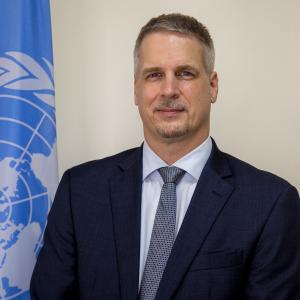It is a pleasure to welcome you to today’s validation workshop – and to thank you for the time, energy, and expertise that you bring to this important process.
We are here today to do more than just reflect on the past or plan for the future.
We are here to co-create something meaningful: the next Country Implementation Plan (CIP) for Fiji – our shared blueprint for delivering results that matter to people, especially those at risk of being left behind.
But let me start by acknowledging the strong partnership between the UN and the Government and people of Fiji. From ambitious climate action to innovative social protection systems, Fiji continues to show regional and global leadership, even in the face of immense challenges.
As we all know, climate change is no longer a distant threat. Here in Fiji, rising sea levels, cyclones, and biodiversity loss are already affecting lives, livelihoods, and entire communities. But Fiji is also home to bold responses, like the Climate Change Act and efforts to build resilience in remote and outer islands.
The UN is proud to be a partner in this journey, supporting the Fiji government and communities in their efforts, from sustainable agriculture and disaster preparedness to inclusive education and digital innovation.
Today’s workshop marks a crucial step forward. The last CIP (2023-2024) helped us focus our efforts across key areas – from biodiversity to gender equality, decent work to inclusive health systems. But we know the context is evolving.
We have heard your concerns about connectivity gaps, data availability, rising food insecurity, and the urgent need to ensure no one is left behind, whether it is children with disabilities in rural schools or women in the informal economy.
That is why this session is not just a technical formality. It is your space to reflect, challenge, and shape the UN’s collective support going forward.
So let me be clear: This is not a UN plan – it is Fiji’s plan, shaped by your voices.
We want to hear what has worked, what has not, and what needs to be done differently to ensure our next CIP (2025 – 2027) is inclusive, impactful, and aligned with the National Development Plan 2025 – 2029 and the 2050 Strategy for the Blue Pacific Continent.
We are now halfway to 2030. And while there is much to be proud of, we still face critical data gaps, and widening inequalities.
So let’s use this moment to re-energize our efforts.
If we align our actions, invest in what works, and stay true to the promise of the SDGs, we can deliver real change – and ensure no one is left behind.
That means accelerating results across the four CF pillars: People, Planet, Prosperity, and Peace – and putting equality, rights, and resilience at the center of all we do, while recognizing and investing in youth and women’s leadership as key drivers of change.
Let me close by saying thank you – Vinaka vakalevu – for your continued partnership, honesty, and dedication. This is just the beginning. Over the coming weeks, the UN will work closely with you to shape the full CIP document. And later this year, we will reconvene for the high-level Joint Steering Committee to endorse the plan.
Together, we can make this more than just a paper. We can make it a shared commitment to the people of Fiji – and a stepping stone toward a more just, sustainable, and inclusive future.
Vinaka Vakalevu, Dhanjavaad, Thank You


